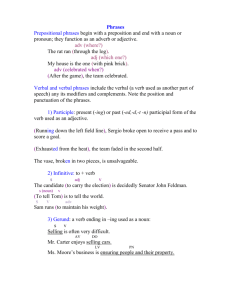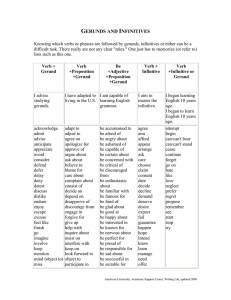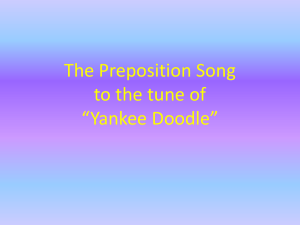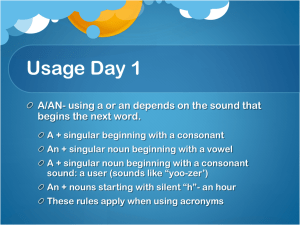TEN RULES OF GRAMMAR AND USAGE THAT
advertisement
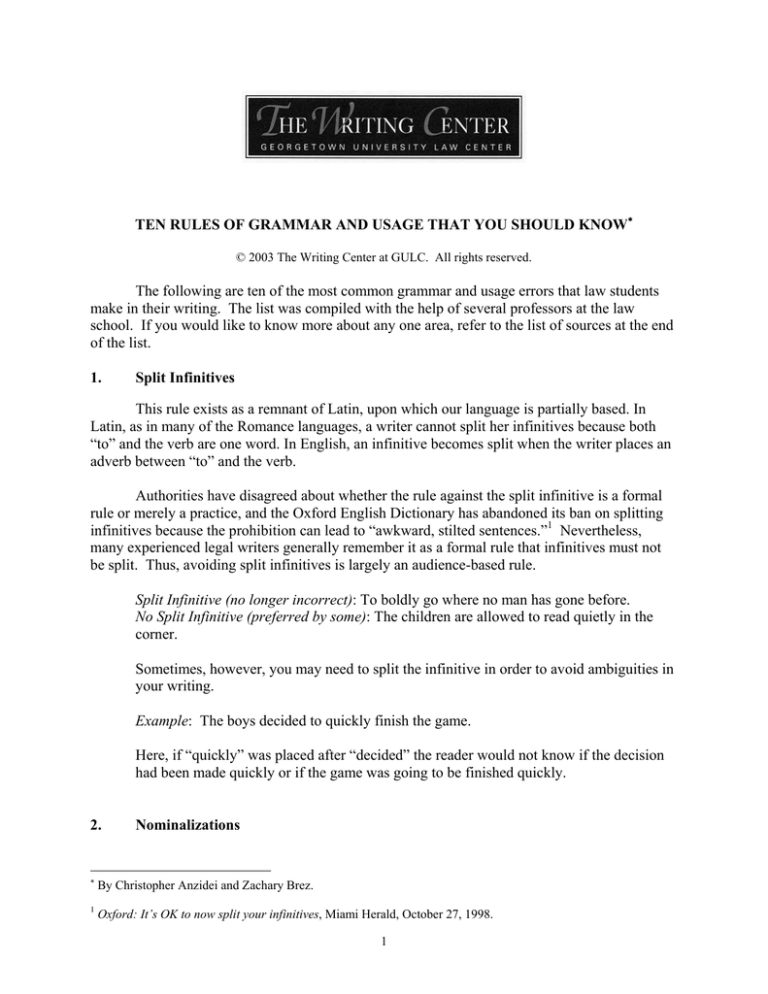
TEN RULES OF GRAMMAR AND USAGE THAT YOU SHOULD KNOW∗ © 2003 The Writing Center at GULC. All rights reserved. The following are ten of the most common grammar and usage errors that law students make in their writing. The list was compiled with the help of several professors at the law school. If you would like to know more about any one area, refer to the list of sources at the end of the list. 1. Split Infinitives This rule exists as a remnant of Latin, upon which our language is partially based. In Latin, as in many of the Romance languages, a writer cannot split her infinitives because both “to” and the verb are one word. In English, an infinitive becomes split when the writer places an adverb between “to” and the verb. Authorities have disagreed about whether the rule against the split infinitive is a formal rule or merely a practice, and the Oxford English Dictionary has abandoned its ban on splitting infinitives because the prohibition can lead to “awkward, stilted sentences.”1 Nevertheless, many experienced legal writers generally remember it as a formal rule that infinitives must not be split. Thus, avoiding split infinitives is largely an audience-based rule. Split Infinitive (no longer incorrect): To boldly go where no man has gone before. No Split Infinitive (preferred by some): The children are allowed to read quietly in the corner. Sometimes, however, you may need to split the infinitive in order to avoid ambiguities in your writing. Example: The boys decided to quickly finish the game. Here, if “quickly” was placed after “decided” the reader would not know if the decision had been made quickly or if the game was going to be finished quickly. 2. Nominalizations ∗ By Christopher Anzidei and Zachary Brez. 1 Oxford: It’s OK to now split your infinitives, Miami Herald, October 27, 1998. 1 A base verb that has been turned into a noun is called a nominalization. While nominalizations are grammatically correct, overusing them can reduce the impact and clarity of your writing. Acceptable: She made the decision to file a lawsuit against her employer after consulting with an attorney. Preferred: She decided to sue her employer after consulting with an attorney. 3. Ending a Sentence with a Preposition Again, this rule is left over from the Latin, where it is impossible for a writer to finish a sentence with a preposition. Avoiding ending a sentence in a preposition might best be characterized as an audience-based rule because some traditional readers pay close attention to it in written work. If you are writing for a traditional audience, you may want to restructure your sentences so as not to finish them with a preposition. Acceptable: He is one of the people I like to study with. Preferred: He is one of the people with whom I like to study. Spoken English, however, differs from written English. It is often impossible to realize you are going to finish a sentence with a preposition until you reach the end of the sentence. Additionally, English has several idioms that require the user to end a sentence with a preposition. To quote Winston Churchill, “Correcting my grammar is something up with which I will not put.” 4. Semicolons Use a semicolon to join two closely related independent clauses that are not separated by a conjunction. Use a comma to join two closely related independent clauses that are separated by a conjunction. Incorrect: The lease states that the landlord must pay for all repairs, it does not address who is responsible for making those repairs. Correct: The lease states that the landlord must pay for all repairs; however, it does not address who is responsible for making those repairs. [Note: “However” is not necessary in this sentence; it is used merely to clarify the relationship between the two clauses.] Correct: The lease states that the landlord must pay for all repairs, but it does not address who is responsible for making those repairs. 5. “That” vs. “Which” Use “that” to introduce a defining clause, a phrase that narrows or defines the range of items being discussed. Use “which” to introduce a clause that does not narrow or define the range of items being discussed. While facially similar, the following two sentences mean very different things. 2 Correct: The evidence that was presented to the jury was accurate. [This sentence means that only a subset of all the available evidence was presented to the jury, and that subset of evidence was accurate.] Correct: The evidence, which was presented to the jury, was very accurate. [This sentence means that all of the evidence was presented to the jury, and that evidence was accurate.] 6. Misused Modifiers The two most common mistakes in this area are dangling modifiers and misplaced modifiers. Dangling modifiers are modifying phrases that do not modify any word in the sentence. Incorrect: In passing legislation, many compromises must be reached. Correct: In passing legislation, the House and the Senate must reach many compromises. The participle phrase “In passing legislation” does not modify any word. Ask yourself who is passing the legislation and add that subject right after the introductory phrase. Incorrect: Based on this reasoning, the court affirmed the defendant's conviction. What is based on this reasoning? The answer is the court's decision. Correct: Based on this reasoning, the court's decision affirmed the defendant's conviction. Misplaced modifiers are modifying phrases that modify the wrong word or phrase in the sentence. Incorrect: Once universally prohibited, a few states have recently legalized the use of marijuana for medicinal purposes. [In this sentence, the phrase “Once universally prohibited” is intended to modify marijuana, not a few states.] Misplaced modifiers can be fixed by rearranging the sentence so that the modifying phrase comes right before the word or phrase it modifies. You can also avoid writing a misplaced modifier by adding a subject and verb to the phrase, thus creating an introductory clause. Correct: Once universally prohibited, medicinal marijuana has recently been legalized in a few states. Correct: Although marijuana was once universally prohibited, a few states have recently legalized its use for medicinal purposes. 3 7. “Who” vs. “Whom” Use "who" if the pronoun is the subject of the verb; use "whom" if the pronoun is the object of a verb, preposition, or infinitive. This rule has become similar to the one for sentences ending in a preposition, that is to say that while strict grammarians will follow this rule to their graves, other readers may find it stiffens the writing. One is probably given even more graces in breaking this rule with spoken, as opposed to written, English. Correct: A security guard witnessed the person who robbed the bank. [In this sentence, who is the subject and robbed is the verb.] Correct: The suspect was a person with whom Joe had worked. [In this sentence, whom is not a subject, but rather it is the object of a preposition, with.] 8. “Hone” vs. “Home” This is a basic rule of usage, but many legal writers confuse the two terms. To “home in on” means to direct, or be directed as by radar, to a destination or target. “Hone” has many different meanings, one of which is to sharpen. Incorrect: The court honed in on the appellant’s argument. Incorrect: The appellant homed his argument in response to the court’s questioning. Correct: The appellant honed his argument in response to the court’s homing in on his Fourth Amendment claims. 9. “Peruse” and “Flammable” “Peruse” historically meant examine in detail, or to scrutinize. Over time, however, the word began to connote informally a casual or leisurely reading. Occasionally, a writer will be confronted with a reader who is aware of only one of the two meanings. A similar confusion has arisen in modern vernacular with “flammable” and its twin, “inflammable.” “Inflammable” is the word that actually means combustible. Because this word is chiefly used in dangerous situations, concern arose when readers began to think the “in” in inflammable meant the word connoted not combustible. To avoid confusion, many containers filled with a dangerous substance now read “flammable.” 10. “Because” vs. “Since” Many legal writers use these two words interchangeably so this is more of an audiencebased rule. To be unambiguous, use “because” to denote a causal relationship; use “since” to denote a temporal relationship. Acceptable: Opposing counsel has called me three times since Tuesday since he wants to settle the case. 4 Preferred: Opposing counsel has called me three times since Tuesday because he wants to settle the case. REFERENCES: Mary B. Ray & Jill J. Ramsfield, Legal Writing: Getting It Right and Getting It Written (3d ed. 2000). The University of Chicago Press, The Chicago Manual of Style (1982). Richard C. Wydick, Plain English for Lawyers (4th ed. 1998). 5
